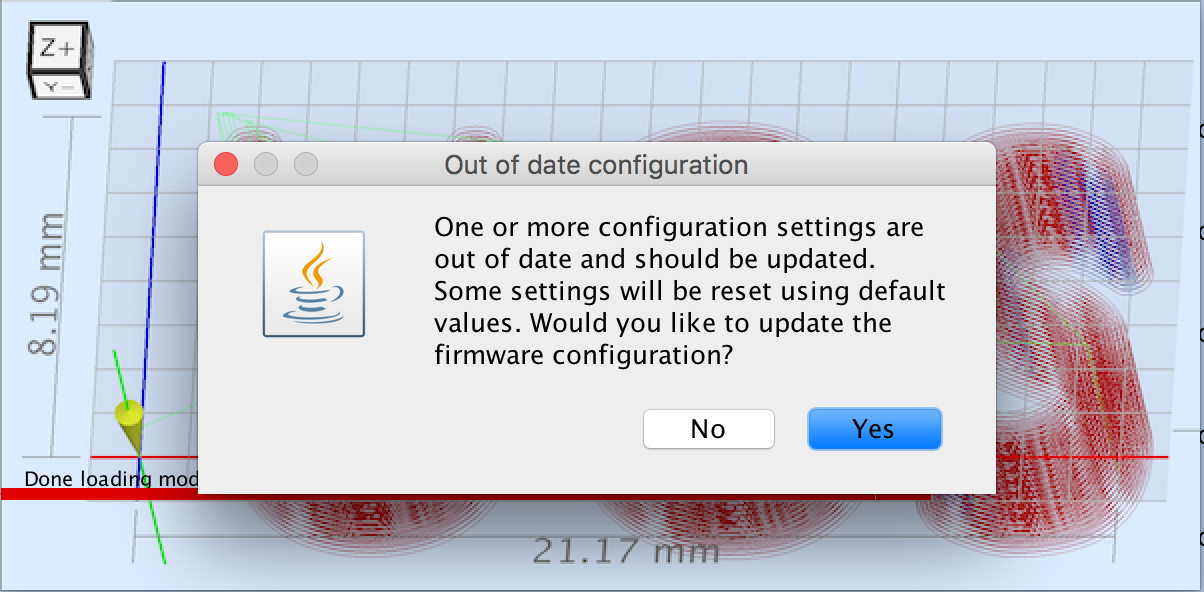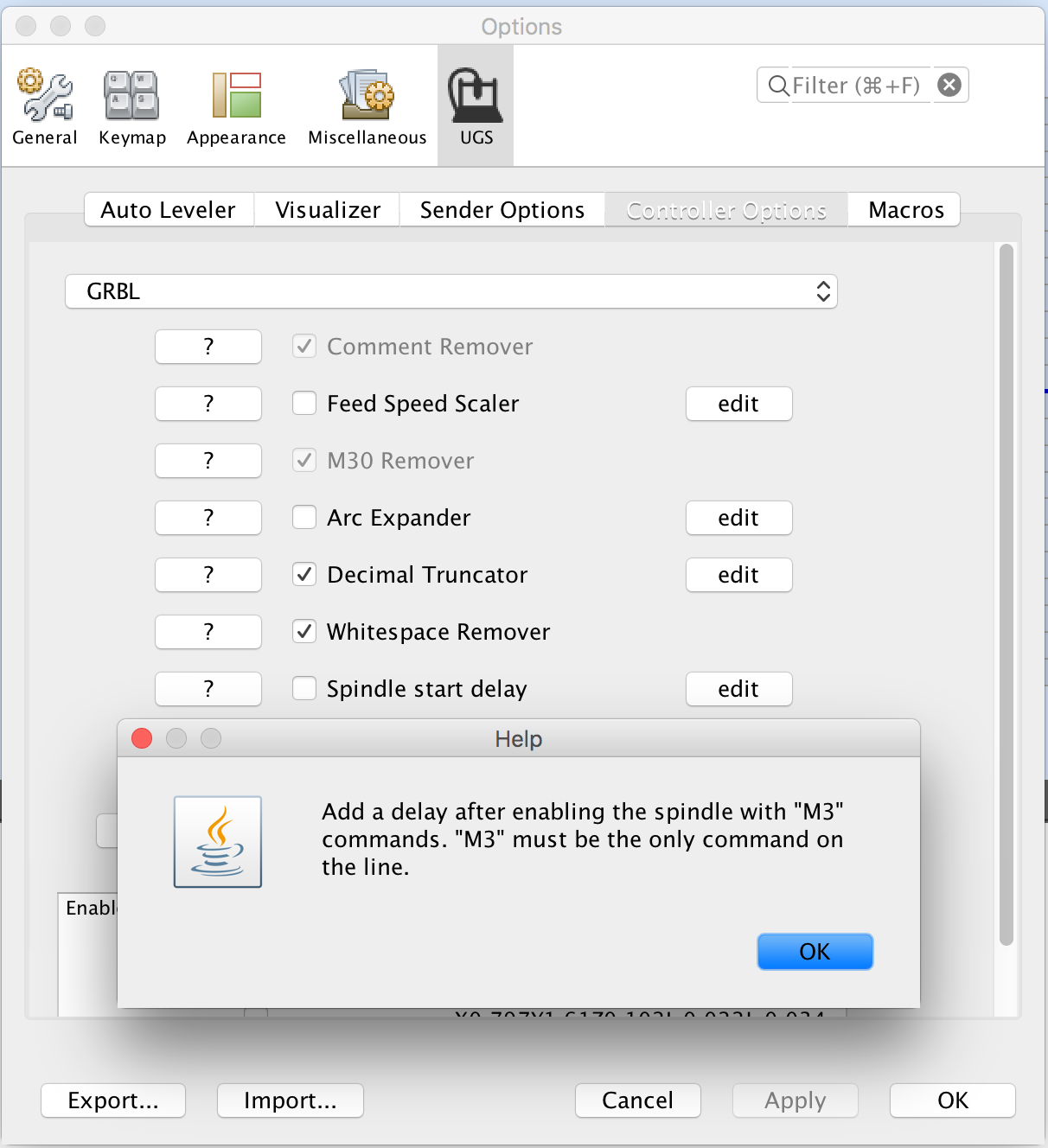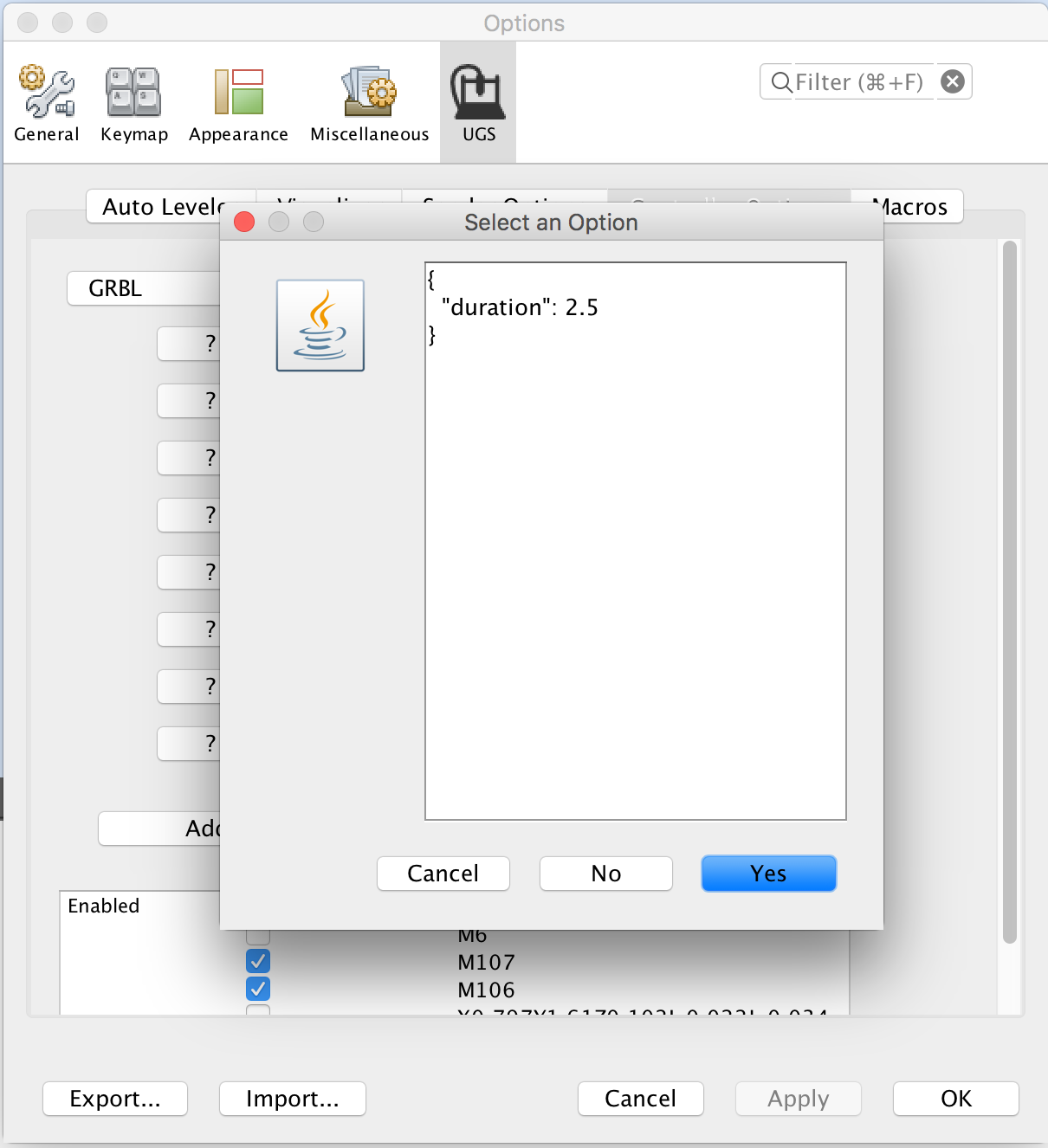Gcode Processor Development
The UGS core library has a flexible gcode processor plugin system. It is designed as a processing pipeline to convert one line of code at a time by passing it through multiple Command Processor plugins. Some advanced features in UGS, like the Auto Leveler, take advantage of this feature to inject a special processor module into the gcode processing pipeline. Other processors are simpler, such as the M30Processor which simply removes unwanted M30 commands, or the CommandLengthProcessor which causes an error if the final processed line has too much data for your controller.
This process is configured using a JSON file which holds processor configuration, order in which processors should appear in the pipeline, and whether or not they are enabled. All of this is configurable in UGS and UGP in a Gcode Processor Configuration menu.
Anatomy of a CommandProcessor
The processor interface is simple. One command goes in along with the current state and a list of output commands come out. A CommandProcessor might discover invalid input, in which case a GcodeParserException can be thrown for the GcodeParser to handle.
public interface CommandProcessor {
/**
* Given a command and the current state of a program returns a replacement
* list of commands.
* @param command Input gcode.
* @param state State of the gcode parser when the command will run.
* @return One or more gcode commands to replace the original command with.
*/
public List<String> processCommand(String command, GcodeState state) throws GcodeParserException;
/**
* Returns information about the current command and its configuration.
* @return
*/
public String getHelp();
}
Simple Example
The CommandLengthProcessor is one of the simplest examples of a CommandProcessor. One thing of interest is that it accepts a length parameter during configuration. By adding a CommandLengthProcessor to the GcodeParser, you can ensure the maximum length of commands.
public class CommandLengthProcessor implements CommandProcessor {
final private int length;
public CommandLengthProcessor(int length) {
this.length = length;
}
@Override
public String getHelp() {
// Global localization helpers are used for the help message.
return Localization.getString("sender.help.command.length") + "\n" +
Localization.getString("sender.command.length")
+ ": " + length;
}
@Override
public List<String> processCommand(String command, GcodeState state) throws GcodeParserException {
if (command.length() > length)
throw new GcodeParserException("Command '" + command + "' is longer than " + length + " characters.");
return Collections.singletonList(command);
}
}
More Complex Examples
The following examples can be found in GitHub, they wont have the full code included.
DecimalProcessor
This is only slightly more complicated than the CommandLengthProcessor. It adds in some config validation by throwing a RuntimeException in the constructor, which is handled by code which configures the GcodeParser. The processCommand method is then able to truncate any decimals using simple string manipulation.
FeedOverrideProcessor
Like the DecimalProcessor, the FeedOverrideProcessor is able to modifie any F-Commands with simple string manipulation.
LineSplitter
The LineSplitter CommandProcessor will actually modify commands by parsing the gcode and rewriting it. There are several utilities used here to help:
- GcodeParser.processCommand - Converts the command string into something easier to work with.
- GcodePreprocessorUtils.extractMotion - Helper to extract all words associated to movement commands, the remainder should still be sent but may not be sent in the context of the rewritten command.
The remaining logic checks the length of any G0 or G1 commands and converts
them, or returns the original command unmodified.
Tutorial: Creating a New CommandProcessor
Creating a fully integrated and configurable CommandProcessor is simple, but does touch a number of different files. This tutorial will go over those pieces in the context of creating a processor named M3Dweller.
Goal
Create a processor which inserts a Dwell command (short delay) whenever the spindle is enabled. This allows any potentially slow setups such as VFD's to come up to speed. It should be configurable via the Gcode Processor Configuration menu.
Creating the processor
First you'll notice that the constructor initializes the command which should be added after our spindle start M3 command. The locale is set to make sure comma is not used as a decimal separator:
private final String dwellCommand;
public M3Dweller(double dwellDuration) {
this.dwellCommand = String.format(Locale.ROOT, "G4P%.2f", dwellDuration);
}
The help method simply adds some comments for the settings GUI:
@Override
public String getHelp() {
return "Add a delay after enabling the spindle with \"M3\" commands. \"M3\" must be the only command on the line.";
}
Everything is then pulled together in the processCommand method to return an extra dwell command when M3 is detected:
// Contains an M3 not followed by another digit (i.e. M30)
Pattern m3Pattern = Pattern.compile(".*[mM]3(?!\\d)(\\D.*)?");
@Override
public List<String> processCommand(String command, GcodeState state) throws GcodeParserException {
if (m3Pattern.matcher(command).matches()) {
return Arrays.asList(command, dwellCommand);
}
return Collections.singletonList(command);
}
All at once now:
public class M3Dweller implements CommandProcessor {
private final String dwellCommand;
// Contains an M3 not followed by another digit (i.e. M30)
Pattern m3Pattern = Pattern.compile(".*[mM]3(?!\\d)(\\D.*)?");
public M3Dweller(double dwellDuration) {
this.dwellCommand = String.format(Locale.ROOT, "G4P%.2f", dwellDuration);
}
@Override
public List<String> processCommand(String command, GcodeState state) throws GcodeParserException {
String noComments = GcodePreprocessorUtils.removeComment(command);
if (m3Pattern.matcher(noComments).matches()) {
return Arrays.asList(command, dwellCommand);
}
return Collections.singletonList(command);
}
@Override
public String getHelp() {
return "Add a delay after enabling the spindle with \"M3\" commands. \"M3\" must be the only command on the line.";
}
}
Hooking up the JSON
The json files are stored in ugs-core/src/resources/firmware_config, each of
these will be updated to include our new processor. Notice that we have an
argument named duration, and that it is disabled by default:
"name": "M3Dweller",
"enabled": false,
"optional": true,
"args": {
"duration": 2.5
}
},{
We also increment the version string, which will prompt users that there is a new configuration file available and they may need to revisit their settings:
- "Version": 3,
+ "Version": 4,
JSON Loader
The last step is to update the CommandProcessorLoader to include logic that creates the new M3Dweller when needed. I used one of the other processors as an example and made sure to make a corresponding entry for the M3Dweller in each of the corresponding code and comment locations:
case "M3Dweller":
double duration = pc.args.get("duration").getAsDouble();
p = new M3Dweller(duration);
break;
There is also a test which should be updated to make sure everything is working:
+ args = new JsonObject();
+ args.addProperty("duration", 2.5);
+ object = new JsonObject();
+ object.addProperty("name", "M3Dweller");
+ object.add("args", args);
+ array.add(object);
+
String jsonConfig = array.toString();
List<CommandProcessor> processors = CommandProcessorLoader.initializeWithProcessors(jsonConfig);
- assertEquals(8, processors.size());
+ assertEquals(9, processors.size());
assertEquals(ArcExpander.class, processors.get(0).getClass());
assertEquals(CommentProcessor.class, processors.get(1).getClass());
assertEquals(DecimalProcessor.class, processors.get(2).getClass());
assertEquals(FeedOverrideProcessor.class, processors.get(3).getClass());
assertEquals(M30Processor.class, processors.get(4).getClass());
assertEquals(PatternRemover.class, processors.get(5).getClass());
assertEquals(CommandLengthProcessor.class, processors.get(6).getClass());
assertEquals(WhitespaceProcessor.class, processors.get(7).getClass());
+ assertEquals(M3Dweller.class, processors.get(8).getClass());
Testing
The command processors lend themselves to thorough testing, so we create a new
M3DwellerTest.java file in the associated test package and write some tests:
@Test
public void testReplaces() throws Exception {
M3Dweller dweller = new M3Dweller(2.5);
String command;
command = "M3";
Assertions.assertThat(dweller.processCommand(command, null)).containsExactly(command,"G4P2.50");
command = "m3";
Assertions.assertThat(dweller.processCommand(command, null)).containsExactly(command,"G4P2.50");
command = "M3 S1000";
Assertions.assertThat(dweller.processCommand(command, null)).containsExactly(command,"G4P2.50");
command = "m3 S1000";
Assertions.assertThat(dweller.processCommand(command, null)).containsExactly(command,"G4P2.50");
command = "(this is ignored) M3 S1000";
Assertions.assertThat(dweller.processCommand(command, null)).containsExactly(command,"G4P2.50");
}
@Test
public void testNoOp() throws Exception {
M3Dweller dweller = new M3Dweller(2.5);
String command;
command = "anything else";
Assertions.assertThat(dweller.processCommand(command, null)).containsExactly(command);
command = "M30";
Assertions.assertThat(dweller.processCommand(command, null)).containsExactly(command);
command = "G0 X0 Y0 (definitely not ready to start the spindle with an M3 yet)";
Assertions.assertThat(dweller.processCommand(command, null)).containsExactly(command);
}
Localizing
In addition to the help message which may use the global Localization helper,
the settings menu will attempt to find something with the same name as in the
JSON file. So we add an entry to
./ugs-core/src/resources/MessagesBundle_en_US.properties, which will later be
pulled into a separate localization service to be localized in other languages.
WhitespaceProcessor = Whitespace Remover
+M3Dweller = Spindle start delay
controller.exception.smoothie.booting = Smoothie has not finished booting.
Conclusion
We have now fully integrated our M3Dweller processor into the UGS framework and users of UGS and UGP can both make use of it.
The raw commit for this feature is found on github here.


